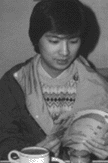|
He turned to Miyuki and said, "Do you like the Impressionist
and Post-Impressionist painters?"
"I don't know much about them," Miyuki said, tapping
her woolen-gloved fingers on the music score as if she was playing
the piano. There was a momentary silence.
"I don't know about your own past, but I was born and
grew up here. It's a town that I love. Last year when I passed
the entrance examination for this college, I was really pleased
because it's been my dream to study in this college and in this
park."
"I like this town, too. I like this place, this park,"
the young man said, "but I've got to leave before long."
"Why? Where are you going?"
"Well, that's what I was thinking about while I was standing
there."
"What are you going to do after you leave?"
"I've no idea. I don't know where I'm going really."
In the still silence the two of them stared at the pond where
a solitary swan silently swam.
After a while Miyuki said, "Please let me see your sketches
... if you don't mind."
"Oh, I'm sorry but I haven't drawn anything in this sketchbook."
"Then why don't you draw something for me now?"
"Unfortunately, I lost my pencil in the park."
"I've got one," said Miyuki, as she took a short
pencil from the pocket of her winter coat.
"Here you are," she said, and handed the pencil
to the young man.
"Well, O.K. I'll try."
|
